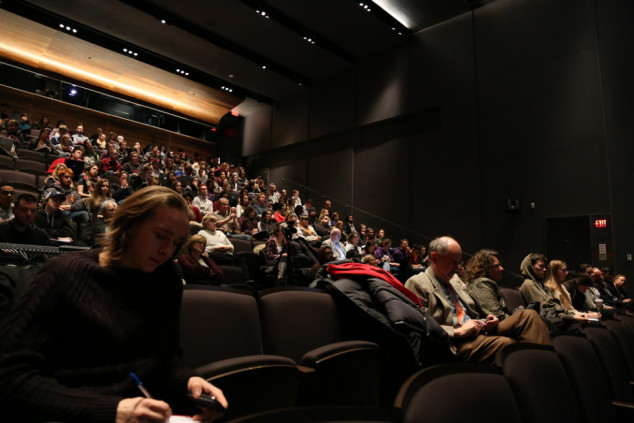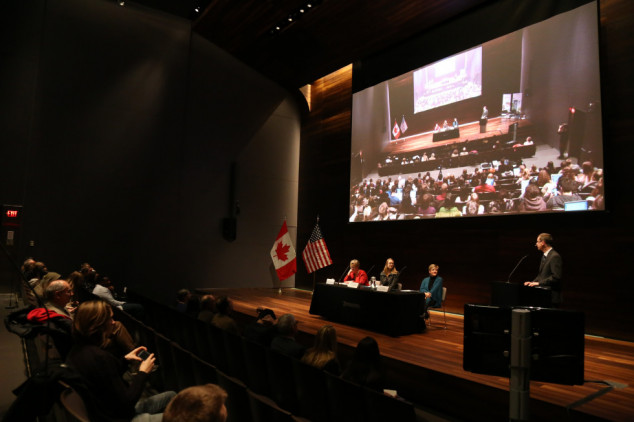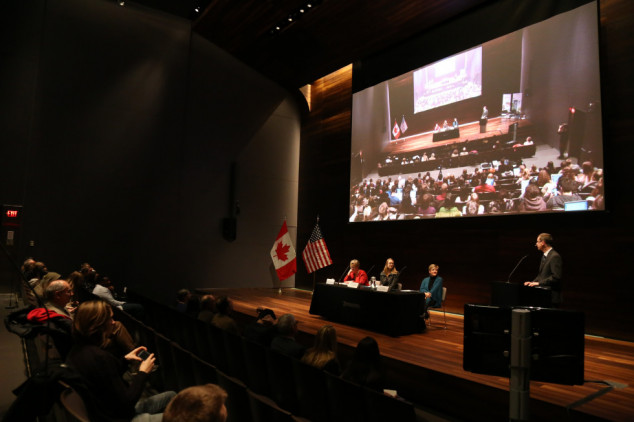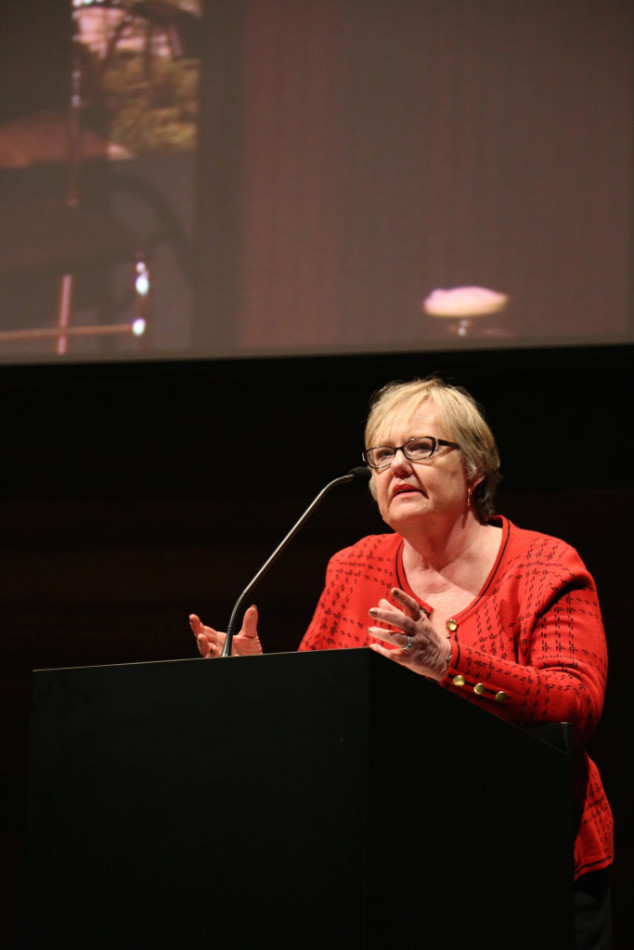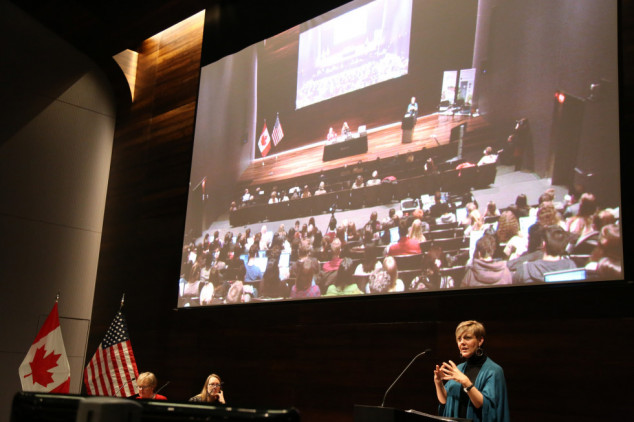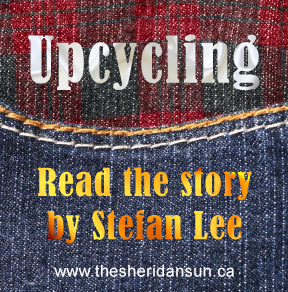Conference tackles the spectre of environmental refugees


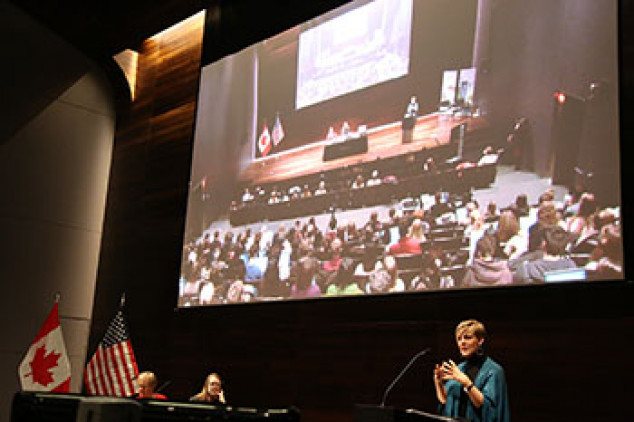
Lori Hunter, right, speaks to students, professors, and attendees at the environmental refugees conference hosted by Wilfrid Laurier University. Joined by Elizabeth Ferris, left, and Elizabeth Fussell, centre. (Photo Credit: Madina Turdieva)
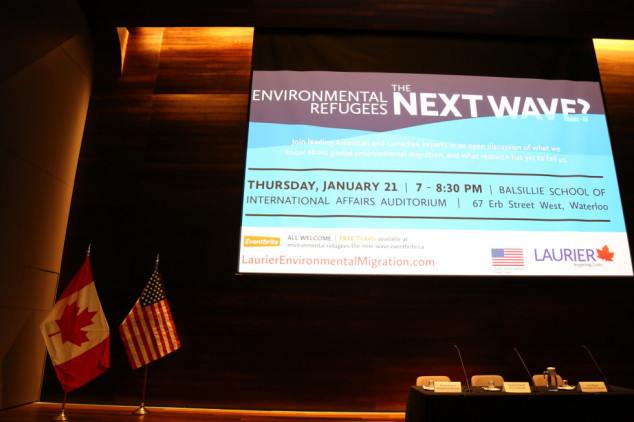
Environmental refugee conference hosted by Wilfrid Laurier University. (Photo Credit: Madina Turdieva)
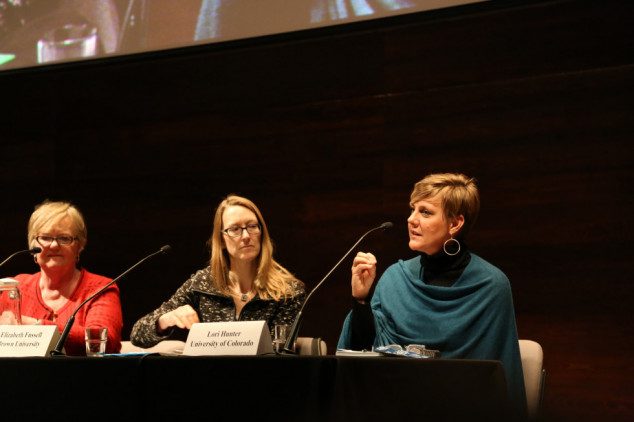
Lori Hunter, right, speaking at the environmental refugee conference hosted by Wilfrid Laurier University, joined by Elizabeth Fussell, centre, and Elizabeth Ferris, left. (Photo Credit: Madina Turdieva)
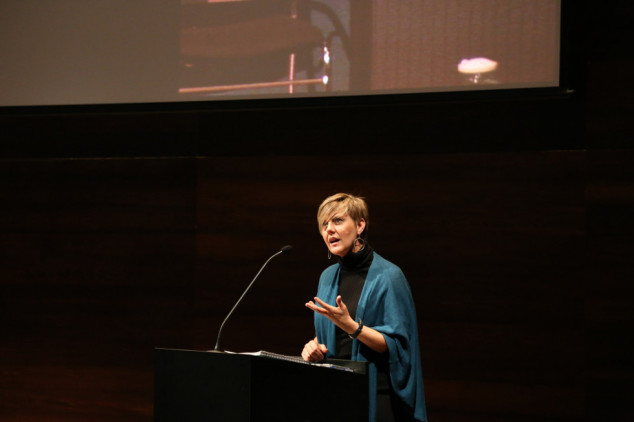
Lori Hunter speaking at the environmental refugee conference hosted by Wilfrid Laurier University. (Photo Credit: Madina Turdieva)
BY JAKE HRIBLJAN
What happens to a nation if it’s submerged under water? What happens if 50 million, or maybe 1 billion, people begin to migrate because of environmental devastation? How would the world respond to a climate crisis that affects the entire planet? These were just a few questions experts and researchers sought to examine two weeks ago at the Balsillie School of International Affairs, in an event titled “Environmental Refugees, The Next Wave?”
Wilfrid Laurier associate professor Robert McLeman organized the event in collaboration with the U.S. Consulate General in Toronto, to tackle what he considers “one of the biggest challenges the world will face this century.”
Consul General Juan Alsace, professors Lori Hunter, Elizabeth Ferris and Elizabeth Fussell, addressed a wide range of topics regarding the advent of environmental refugees.
“President Obama has warned on multiple occasions in the past year that by failing to control greenhouse gas emissions today, we jeopardize international security tomorrow,” said Max Blouw, Wilfrid Laurier president and vice-chancellor. “We raise the risk that millions of people around the world will be displaced from their homes and livelihoods.”
If greenhouse gas emissions cannot be controlled, how will the international community respond to mass displacement from environmental disaster?
“The International Displacement Monitoring Centre estimates that an average of 20 million people each year are displaced from their homes because of natural disasters,” said Alsace. “Experts are telling us that these numbers are going to continue to grow in the coming decades.”
RELATED STORIES:
- The man who would be the first climate change refugee
- Where will the climate refugees go?
- Virginia Islanders Could Be U.S. First Climate Change Refugees
Elizabeth Ferris, a senior research associate at Georgetown University and senior fellow at the Brookings Institution in Washington D.C., says there are a host of issues concerning environmental refugees from understanding migration patterns, word usage for legal purposes, and ethical dilemmas.
“Migration movements are multi casual. It isn’t just an environmental event usually,’ said Ferris. “Usually it’s a constellation of economics, social, family, an environmental issue that surges.”
Ferris says we also need to determine a language for classifying environmental refugees and migrants.
“You may have seen climate change refugee, environmental migrant, environmental induced displacement, climate changed induced displacement, eco-migrants, new terms coming out are survival migrants, crisis migrants,” said Ferris. “Words have different legal meanings, different traditions.”
Ferris says how the media treats Syrian refugees is a good example of why the language used to describe refugees is important.
“We see in some of the characterizations of Syrians fleeing, if you call them migrants it’s a different thing than if you call them refugees,” Ferris said. “People who work with refugees hate the term climate change refugee, it’s somebody running their fingernails on a blackboard, because refugee has a very precise legal definition.”
Ferris says there is an ethical dilemma involved when governments must decide who to help, and in what capacity.
“Should people who are displaced, or who migrate, or who flee from the effects of climate change, received preferential treatment over those who are “just” fleeing poverty? Or war? Or maybe other kinds of disasters?” said Ferris.
These problems have been approached in a smaller capacity in the past. Elizabeth Fussell, who is a professor of sociology at Brown University, has spent her career researching migration patterns and environmental impact surrounding New Orleans and the aftermath of Hurricane Katrina. She says Hurricane Katrina is a good case study in understanding the effects of climate disasters.
“The foundation of the land in [New Orleans] was inundated,” said Fussell. “Because the city is bellow sea level… that water stayed. It stayed in the city for six weeks. The pressure of that water on all of the urban infrastructure, the roads, the underground pipes, the electrical system, destroyed so much of the urban infrastructure of the city.”
In six weeks, the floods from Katrina destroyed what took centuries to build, totally changing New Orleans, says Fussell.
“A year later in 2006, only half of the population had returned,” Fussell said. “Clearly this event set in motion several different migration streams.”
These questions are incredibly difficult to answer, and require millions of dollars and countless hours of research to solve. But researchers are getting better at understanding these patterns.
“Jumping on the climate conflict bandwagon is over simplifying these hugely complex scenarios, it’s environment, it’s poverty, it’s political instability, and it’s all these things combined,” Hunter said.
Lori Hunter, who is a professor of sociology at the University of Colorado at Boulder, says climate signals are already the dominant factor when determining migration patterns.
“Changes in precipitation and changes in temperature, now contribute explanatory power to our understanding of migration in a way that they didn’t before,” Hunter said. “We are really entering a different period.”
However, theirs is still plenty of work to be done. “No one has the answers right now,” said Ferris.
Students and attendees posed questions to the three professors, and one student asked why these questions are typically examined through a military and security perspective.
“[The majority of research funding] in the U.S. is through the Department of Defence, so that shows you that the security angle is someplace that government is willing to put money behind it,” said Hunter. “
Hunter says that some researchers are too quick to blame climate change for conflicts as a way to access funds. “Jumping on the climate conflict bandwagon is over simplifying these hugely complex scenarios, it’s environment, it’s poverty, it’s political instability, and it’s all these things combined,” Hunter said.
Fussell argues that the excessive security focus might be rooted in the history of the United States.
“The disaster research tradition, which even predates our knowledge of climate change, tended to have a very militaristic view of how to respond to disasters,” said Fussell. “A lot of our hazard response policies, that are very much top down policies, where the first responders come in and they may often say, ‘we need to impose some sort of curfew and prevent looting and do this sort of thing’ and so it’s a very militaristic approach to controlling a disaster affected community. And I think one consequence of this is the loss of rights of individuals in that disaster affected community and the cost of that is you disempower [those who could help].”
The three professors spoke for roughly an hour in front of students, professors, guests and the Consult General.
Alsace stated that President Obama and the U.S. government are very concerned with these matters and hope to come up with new solutions to fight climate disasters.
Saved under Community
Tags: Climate Change, climate refugee, crisis, environment, environmental disaster, hamilton, migrant, oakville, refugees, slideshow, Syria, Toronto, waterloo, Wilfrid Laurier University




